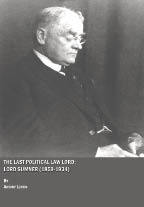Judicial biography is out of fashion: Lord Chancellors apart, the lives of the bewigged great and good are confined within the narrow boundaries of the Dictionary of National Biography. Judicial autobiography is too often driven more by the self-esteem of the authors than the intrinsic interest of the subject. Anthony Lentin convincingly establishes his subject’s claim to resurrection.
Born John Andrew Hamilton and of Mancunian middle-class origins, the future Viscount profited from an education at two great forcing houses of talent, Manchester Grammar School and Balliol. Called to the Bar by the Inner Temple, he was no instant success either in London or on the Northern Circuit. For many years he earned a living by his pen, not his tongue. He became one of the DNB’s most prolific contributors while writing a brief life of Daniel O’Connell and editing a leading textbook on Marine Law. But perseverance as well as forensic skill is a necessary precondition of success at the Bar and once his pupilmaster, Bigham, was promoted to the Bench, he took over his mantle as head of chambers and his successful commercial practice.
His report into an allegation that the local education authority in Swansea had discriminated against a Church of England school, brought him to national prominence, and in 1897 he was appointed to the High Court Bench. But compared with contemporaries such as F. E. Smith or Rufus Isaacs, he had shown no signs of political partisanship, nor was his preferment the result of political patronage.
His judicial progress was rapid. In three years he was in the Court of Appeal and barely a year later in the House of Lords — two great leaps forward unthinkable today, where the Lord Chancellor’s role as selector has been taken over by a Judicial Services Commission, and even appointments to the Supreme Court are advertised.
In 1915 Asquith considered him a candidate for the Woolsack, the first of three occasions on which he was the nearly man for the top job. Yet Sumner soon showed himself not a Liberal, but a robust Conservative. The causes with which he came to be associated over the next decade, the retention of Ireland and India within the Empire, full reparations from Germany, preservation of the powers of House of Lords classed him as one of the Tory diehards.
Sumner’s defence of General Dyer in a Lords’ debate on the Amritsar Massacre itself generated debate as to whether Law Lords should abstain from political controversy; but he believed that a Law Lord was still a Lord with the right to free expression enjoyed by all Peers. Times have changed indeed. This year Law Lords, who have, for more than a decade, followed a self- denying ordinance, are to be relocated in a Supreme Court thus freed from even the appearance of involvement in the legislative process.
Judgments are less ephemeral than journalism; but Sumner’s stature as a jurist is secure. Some of his major dicta are still quoted in common law courts and his purple passages rehoused in anthologies. He had, too, a hinterland, music and mountaineering, painting and history. Like most biographers, Lentin dons the robes of counsel for the defence, but his conventional plea in mitigation for judges known (as Sumner was) for their stiffness and sarcasm on the bench, that he was courteous and humorous on informal occasions is no more convincing than the obituarist’s cliché. ‘But in private life…’
Sumner was a fine judge but not, I suspect, a pleasant man.
Michael Beloff QC is writing The Last of the Lord Chancellors.






Comments